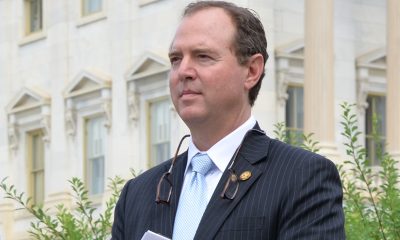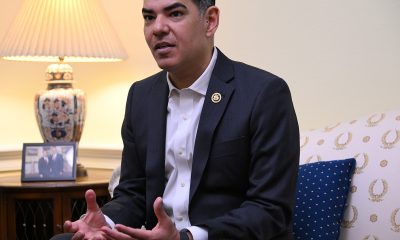National
Key Senate races a focus for LGBT community
Pro-gay Dems face tough fights in Nevada, Wisc., Pa., Colo.
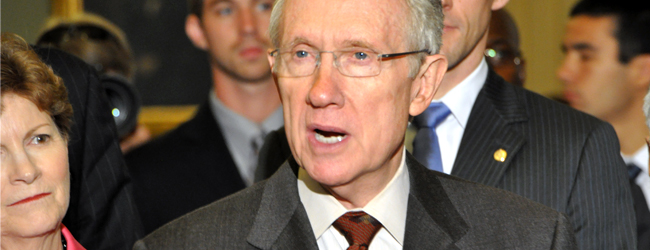
On Election Day, many eyes will be focused on several key Senate races where lawmakers with a history of support for the LGBT community are facing tough challenges on the road to re-election.
By far the most high profile race in this group is taking place in Nevada, where Senate Majority Leader Harry Reid (D-Nev.) is fighting for his political life against Republican Sharron Angle, a Tea Party candidate and former Nevada State Assembly member.
Several polls have Angle ahead of Reid by a few points. On Tuesday, Rasmussen Reports made public a poll that found Angle leading Reid by four percentage points among likely voters.
As majority leader, Reid is responsible for moving forward with pro-LGBT legislation in the Senate and would continue to decide the agenda if he wins on Election Day.
Reid has expressed support for the Employment Non-Discrimination Act and repeal of “Don’t Ask, Don’t Tell.” A Mormon, Reid has also been critical of the Church of Jesus Christ of Latter-day Saints’ lead role in backing Proposition 8 in California, which ended same-sex marriage in the state in 2008.
Michael Mitchell, executive director of the National Stonewall Democrats, said a win for Reid is important to the LGBT community because some would likely blame his loss on his leadership on LGBT issues.
“I have a feeling that’s where the Republicans will go with this, and it will be over ‘Don’t Ask, Don’t Tell,’ or it will be that he was too liberal,” Mitchell said. “And, of course, our issues in that moniker of ‘too liberal.'”
In contrast to Reid, Angle has said “Don’t Ask, Don’t Tell” shouldn’t be repealed until the Pentagon has a chance to finish its review of the policy.
Angle has also said in a questionnaire that she’d refuse campaign contributions from businesses that have pro-gay policies in place. She has, however, reportedly taken contributions from political action committees to which such businesses have donated.
The Republican candidate is also known for having ties to an anti-gay party in Nevada in which she once held membership, the American Independent Party.
In 1994, when Angle was involved in the group, the American Independent Party published a 16-page newspaper ad insert calling for a state constitutional amendment permitting discrimination against LGBT people. The insert refers to LGBT people as “sodomites” and portrays them as “child-molesting, HIV-carrying, Hell-bound freaks.”
Despite Angle’s positions, one Republican LGBT group is looking forward to seeing Reid go because of the economic conditions facing Nevada.
Christian Berle, deputy executive director of the Log Cabin Republicans, said the race in Nevada is “as much about voter distaste with Reid’s record as it is about the positions presented by Angle and her campaign.”
“Nevadans want a senator who will stand for their values and deliver for a state that has a 15 percent unemployment rate, not a legislator who is jockeying for legislation to favor the White House agenda first and foremost,” Berle said.
While enjoying general support among LGBT people, Reid has been criticized for not moving fast enough on pro-LGBT legislation.
Some supporters of “Don’t Ask, Don’t Tell” repeal said he politicized a repeal measure in September by limiting the number of amendments that could have been offered on the bill once it reached the floor.
The Senate was unable to move forward with the legislation, and many senators said the amendment issue prevented them from voting in the affirmative.
But Mitchell said he’s “tired of hearing Republicans and other folks” blame Reid for the failure of “Don’t Ask, Don’t Tell” repeal in the Senate because he said the majority leader was doing his job by limiting the number of amendments on the bill.
“With the incredible obstructionism from the Republicans that were blocking every single bill almost,” Mitchell said. “There are like 420 bills that the Senate needed to pick up that the House passed. As majority leader, he needs to start to pull things together to try and get things through.”
Mitchell said faulting Reid for the failure of “Don’t Ask, Don’t Tell” in the Senate is “placing the blame in wrong place” and said “the blame is solely on the Republicans there.”
Another race of interest is taking place in Wisconsin, where U.S. Sen. Russ Feingold (D-Wis.) is running against Republican Ron Johnson, a wealthy plastics manufacturer.
Many polls have Feingold trailing Johnson. On Tuesday, Rasmussen published a poll that found Feingold behind Johnson by seven percentage points among Wisconsin likely voters. Cook Political Report identifies the race as “leans Republican.”
Feingold is known for having long been a friend to the LGBT community. In 1996, he was among 14 senators to vote against passage of the Defense of Marriage Act.
In the current Congress, Feingold has co-sponsored ENDA and legislation that would end “Don’t Ask, Don’t Tell.” The Wisconsin senator also was responsible for an amendment to State Department budget legislation that would require the U.S. government to take more active role in LGBT issues overseas.
Michael Cole, a Human Rights Campaign spokesperson, said Feingold deserves support from the LGBT community because he has long been a “progressive champion, broadly, and particularly for the LGBT community for years.
“I think that are so many issues in play out in the field that it is hard, I think, for LGBT people to see such a champion in a tough race,” Cole said. “It speaks to the difficult political environment that’s out there right now.”
Mitchell praised Feingold for sometimes being a maverick and said his loss would be “heartbreaking” because his voice is distinct among the Senate Democratic caucus. Earlier this year, the senator joined with most Republicans to vote against financial reform legislation.
“He doesn’t always vote lock step,” Mitchell said. “He’s very much a freethinker, and I think we’re seeing less and less of that in both houses actually.”
Still, an anti-gay label doesn’t fit Johnson. The Republican candidate said he would support repeal of “Don’t Ask, Don’t Tell” on the condition that the Pentagon backs an end to the law.
Last month, Johnson told reporters that he favors nondiscrimination, but wants to see the Pentagon’s report on how “Don’t Ask, Don’t Tell” repeal would affect operations. He said if the report were convincing, he would vote to remove the statute from the books.
Berle said the Wisconsin race represents “a remarkable contrast” between a long-serving politician and “a businessman who knows what it takes to sign the front of a paycheck. Berle also commended Johnson for being willing to vote for repeal of the military’s gay ban.
“Johnson’s support for ending the failed ‘Don’t Ask, Don’t Tell’ policy is representative of a broad swath of Republicans throughout the country who favor open service,” Berle said.
In the center of the country, another race is playing out where the candidates have divergent views on gay issues.
Sen. Michael Bennet (D-Colo.) is vying to retain his seat against Republican Ken Buck, a Tea Party candidate and district attorney in the state.
The race between Buck and Bennet is seen as among the closest in the country. On Monday, Public Policy Polling published numbers finding that, among likely Colorado voters, 47 percent support Buck and while another 47 percent support Bennet.
Buck has made several anti-gay comments throughout the course of his campaign. In a September debate, Buck said he opposes “Don’t Ask, Don’t Tell” repeal because he said the U.S. military should be as “homogeneous as possible.”
In another recent debate on NBC’s “Meet the Press,” Buck said being gay is a choice and compared it to alcoholism.
“I think that birth has an influence over it, like alcoholism and some other things, but I think that, basically, you have a choice,” he said.
By contrast, Bennet has taken pro-LGBT positions since his appointment to his seat in the current Congress, such as signing on as a co-sponsor of ENDA and legislation to repeal “Don’t Ask, Don’t Tell.”
Cole said the choice for LGBT people in the Colorado race is distinct based on the positions of the candidates.
“You have Michael Bennet, who has been a strong voice for the community running against Buck, who just on ‘Meet the Press’ last weekend made his dangerous comments about LGBT people,” Cole said.
Mitchell also said a win for Bennet is important in Colorado because of statements Buck has made against gays as well as recent remarks against the separation of church and state.
“Ken Buck is little crazy, right?” Mitchell said. “His statement of separation of church and state … I think when you start to peel the layers down from that, I think that’s a pretty extreme view.”
But Berle characterized the Colorado race as “a referendum on the failed Democratic leadership” in the Senate.
“Coloradans are looking for a leader who will oppose out of control government spending and support economic policies designed to get the economy back on track,” Berle said.
Berle said Log Cabin “strongly disagrees with Buck’s belief that sexual orientation is a choice,” but recalled the candidate’s previous work as a prosecutor.
“We remember that this is the same man who as district attorney zealously prosecuted the murderers of a young transgender woman in 2008,” Berle said. “Despite our disagreements, this is evidence that Buck is willing to listen on issues important to gay and lesbian Americans.”
Another tight race is unfolding in Pennsylvania, where Rep. Joe Sestak (D-Pa.), a two-term House lawmaker and former Navy admiral, is vying for an open seat against Pat Toomey, a former U.S. House member and former president of the Club for Growth.
A poll published Tuesday by Reuters/Ipsos found that race between Sestak and Toomey is a dead heat. Among the Pennsylvania adults who were polled, 46 percent favored Sestak in the election and another 46 percent supported Toomey.
During his time in the U.S. House, Sestak has been vocal in his support for the LGBT community and repeal of “Don’t Ask, Don’t Tell.” He’s voted for hate crimes protection legislation as well as a version of ENDA.
In contrast, during his earlier tenure in the U.S. House, Toomey voted for a constitutional ban on same-sex marriage in 2004 and a measure in 1999 that would have banned adoption by gays in D.C.
Still, Toomey said earlier this month during a debate he would back repeal of “Don’t Ask, Don’t Tell” if military leaders can ensure an end to the law will improve and not undermine its capabilities.
Berle emphasized support for Toomey based on the former U.S. House member’s “consistent voice for fiscal conservatism.”
“His message resonates with Pennsylvanians who are particularly annoyed with being represented by Sen. Arlen Specter who put his own career ahead of his constituents’ interests when he switched parties,” Berle said.
But Cole also emphasized the distinction between Sestak and Toomey in the Senate race based on the Democratic candidate’s support for the LGBT community.
“You have Joe Sestak, the highest-ranking military officer serving in Congress, who is a staunch supporter of ‘Don’t Ask, Don’t Tell’ repeal, running against the guy whom Rick Santorum called ‘too conservative,” Cole said.
Similarly, Mitchell said a win for Sestak in Pennsylvania is important because the Keystone State is considered a “bellwether” for the rest of the country.
“It’s very middle of the road,” Mitchell said. “I think for there to be a win by Sestak in Pennsylvania softens the blow for some of the other races that we may lose.”
Federal Government
Mass HHS layoffs include HIV/AIDS prevention, policy teams
Democratic states sue over cuts

Tuesday began a series of mass layoffs targeting staff, departments, and whole agencies within the U.S. Department of Health and Human Services under Secretary Robert F. Kennedy Jr., who reportedly plans to cut a total of 10,000 jobs.
On the chopping block, according to reports this week, is the Office of Infectious Disease and HIV/AIDS Policy. A fact sheet explaining on the restructuring says “a new Administration for a Healthy America (AHA) will consolidate the OASH, HRSA, SAMHSA, ATSDR, and NIOSH, so as to more efficiently coordinate chronic care and disease prevention programs and harmonize health resources to low-income Americans.”
The document indicates that “Divisions of AHA include Primary Care, Maternal and Child Health, Mental Health, Environmental Health, HIV/AIDS, and Workforce, with support of the U.S. Surgeon General and Policy team.”
“Today, the Trump administration eliminated the staff of several CDC HIV prevention offices, including entire offices conducting public health communication campaigns, modeling and behavioral surveillance, capacity building, and non-lab research,” said a press release Tuesday by the HIV + Hepatitis Policy Institute.
The organization also noted the “reassignments” of Jonathan Mermin, director of the National Center for HIV, Viral Hepatitis, STD, and TB Prevention, and Jeanne Marrazzo, director of the National Institutes of Health’s National Institute of Allergy and Infectious Diseases. Both were moved to the Indian Health Service.
“In a matter of just a couple days, we are losing our nation’s ability to prevent HIV,” said HIV + Hepatitis Policy Institute Executive Director Carl Schmid. “The expertise of the staff, along with their decades of leadership, has now been destroyed and cannot be replaced. We will feel the impacts of these decisions for years to come and it will certainly, sadly, translate into an increase in new HIV infections and higher medical costs.”
The group added, “We are still learning the full extent of the staff cuts and do not know how the administration’s announced reorganization of HHS will impact all HIV treatment, prevention, and research programs, including President Trump’s Ending the HIV Epidemic initiative,” but “At the moment, it seems that we are in the middle of a hurricane and just waiting for the next shoe to drop.”
A group of 500 HIV advocates announced a rally planned for Wednesday morning at 8 a.m., at the U.S. Capitol lawn across from the Cannon House Office Building, which aims to urge Congress to help stop the cuts at HHS.
“Over 500 advocates will rally on Capitol Hill and meet with members of Congress and Hill staff to advocate for maintaining a strong HIV response and detail the potential impact of cuts to and reorganization of HIV prevention and treatment programs,” the groups wrote.
The press release continued, “HHS has stated that it is seeking to cut 10,000 employees, among them 2,400 CDC employees, many doing critical HIV work. It also seeks to merge HIV treatment programming into a new agency raising concerns about maintaining resources for and achieving the outstanding outcomes of the Ryan White HIV/AIDS Program.”
On Tuesday a group of Democratic governors and attorneys general from 23 states and D.C. filed a lawsuit against HHS and Kennedy seeking a temporary restraining order and injunctive relief to halt the funding cuts.
U.S. Centers for Disease Control and Prevention withdrew approximately $11.4 billion in funding for state and community health departments during the COVID-19 pandemic response, along with $1 billion to the Substance Abuse and Mental Health Services Administration.
“Slashing this funding now will reverse our progress on the opioid crisis, throw our mental health systems into chaos, and leave hospitals struggling to care for patients,” New York Attorney General Letitia James said.
State Department
Former US envoy for global LGBTQ, intersex rights slams Trump
Former President Joe Biden appointed Jessica Stern in 2021
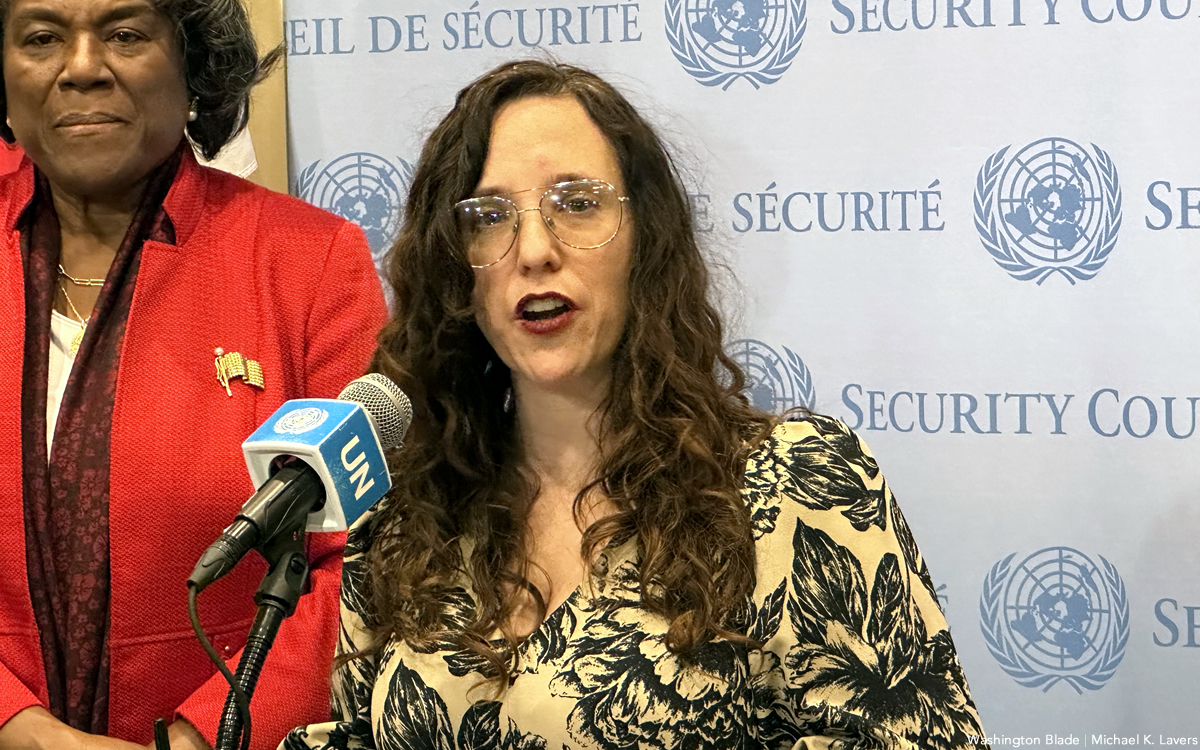
Jessica Stern, the former special U.S. envoy for the promotion of LGBTQ and intersex rights, says the work that she and her colleagues did under the Biden-Harris administration is “being systematically dismantled.”
“As the person who was responsible for leading U.S. foreign policy on LGBTQI+ issues, it’s been very difficult for the past two months to see that work being systematically dismantled,” she told the Washington Blade on March 19 during a telephone interview.
Stern was the executive director of Outright International, a global LGBTQ and intersex advocacy group, when then-President Joe Biden appointed her in June 2021.
The promotion of LGBTQ and intersex rights was a cornerstone of the Biden-Harris administration’s overall foreign policy. These efforts specifically included the decriminalization of consensual same-sex sexual relations and marriage equality efforts in countries where activists said they were possible through the legislative or judicial processes.
The Trump-Vance administration’s decision to freeze most U.S. foreign aid spending for at least 90 days has had a devastating impact on the global LGBTQ and intersex rights movement. President Donald Trump’s executive order that bans the State Department from issuing passports with “X” gender markers has prompted Germany and several other European countries to issue travel advisories for transgender and nonbinary people who are planning to visit the U.S.
Stern said the Trump-Vance administration “has studied the anti-LGBTQI strategies of other countries and basically imported the worst ideas from around the world: The most violent, the most dehumanizing, the most targeting strategies.” Stern added these policies have emboldened Hungarian Prime Minister Viktor Orbán, Russian President Vladimir Putin, Argentine President Javier Milei and other anti-LGBTQ heads of state.
“It’s one thing when a small country that has limited global reach implements anti-LGBTQI laws and policies. It’s another thing when one of the world’s superpowers does so,” Stern told the Blade. “There’s no question that the U.S.’s regression on LGBTQI rights is actually going to accelerate backlash against LGBTQI people around the world.”
“We provide political legitimacy to those ideas, but also we’re forging new alliances and coalitions, and we’re pushing these ideas on other countries,” she added. “So, it’s not a passive action. The U.S. government currently is actively funding and disseminating anti-LGBTQI hatred around the world.”
Former State Department colleagues ‘afraid every day’
The Trump-Vance administration in a Feb. 3 statement that defended its efforts to dismantle the U.S. Agency for International Development noted examples of the organization’s “waste and abuse” included $2 million for “sex changes and ‘LGBT activism'” in Guatemala and $1.5 million to “advance diversity, equity and inclusion in Serbia’s workplaces and business communities.” Secretary of State Marco Rubio last month said 83 percent of USAID contracts have been cancelled, and the remaining will “now be administered more effectively under the State Department.”
Rubio after the Trump-Vance administration froze nearly all U.S. foreign aid spending issued a waiver that allowed the President’s Emergency Plan for AIDS Relief and other “life-saving humanitarian assistance” programs to continue to operate.
The Blade has previously reported PEPFAR-funded programs in Kenya, South Africa, and elsewhere have suspended services and even shut down because of a lack of U.S. funding. UNAIDS Executive Director Winnie Byanyima on March 24 said 6.3 million more people around the world will die of AIDS-related complications over the next four years if the U.S. does not fully restore its foreign assistance.
Stern said her former State Department colleagues are “afraid every day.”
“They never know, ‘Am I going to be fired today?’ “Am I going to be put on administrative leave?’,” she said. “I cannot even imagine what it’s like to go to work every day.”
Stern told the Blade her former colleagues tell her that “there’s not a lot of foreign policy work happening because there’s so much disruption being caused by DOGE (the Department of Government Efficiency).”
“Entire departments have been decimated,” she said, noting one of them has lost 60 people. “It’s almost inconceivable to figure out how to restructure your work when your resources have been decimated.”
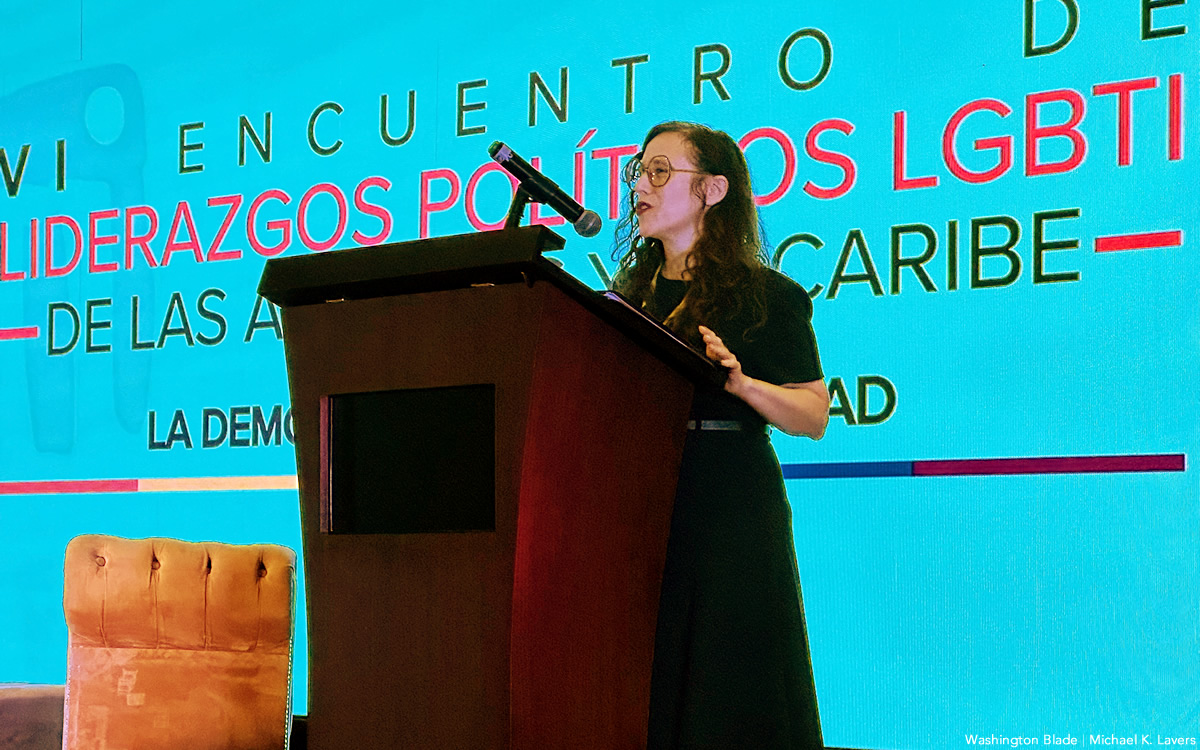
Stern described herself as “an eternal optimist” when the Blade asked whether she thinks the U.S. can ever stand for LGBTQ and intersex rights abroad.
“You have to believe in human rights,” she said.
Stern said former Secretary of State Antony Blinken as “an ally on LGBTQI issues.” Stern also said many of her now former State Department colleagues thanked her and her team for their work before they left government.
“There’s so much compassion from straight and cisgendered allies, from career officials, people that are not human rights experts or specialists, people that don’t focus on the well-being of LGBTQI people, but people that care very much about the United States standing for its values, the rule of law, equality for all, and this notion that it is in our national interest to ensure that there is safety, prosperity, and well-being for people around the world,” she said.
“The situation we find ourselves in will not last forever,” added Stern. “What we have to do is figure out how to hold the line right now, and how to organize for the future.”
She stressed ways to “hold the line” include litigation, protests, letters-to-the-editor, demanding accountability from lawmakers.
“There’s so much to do,” said Stern.
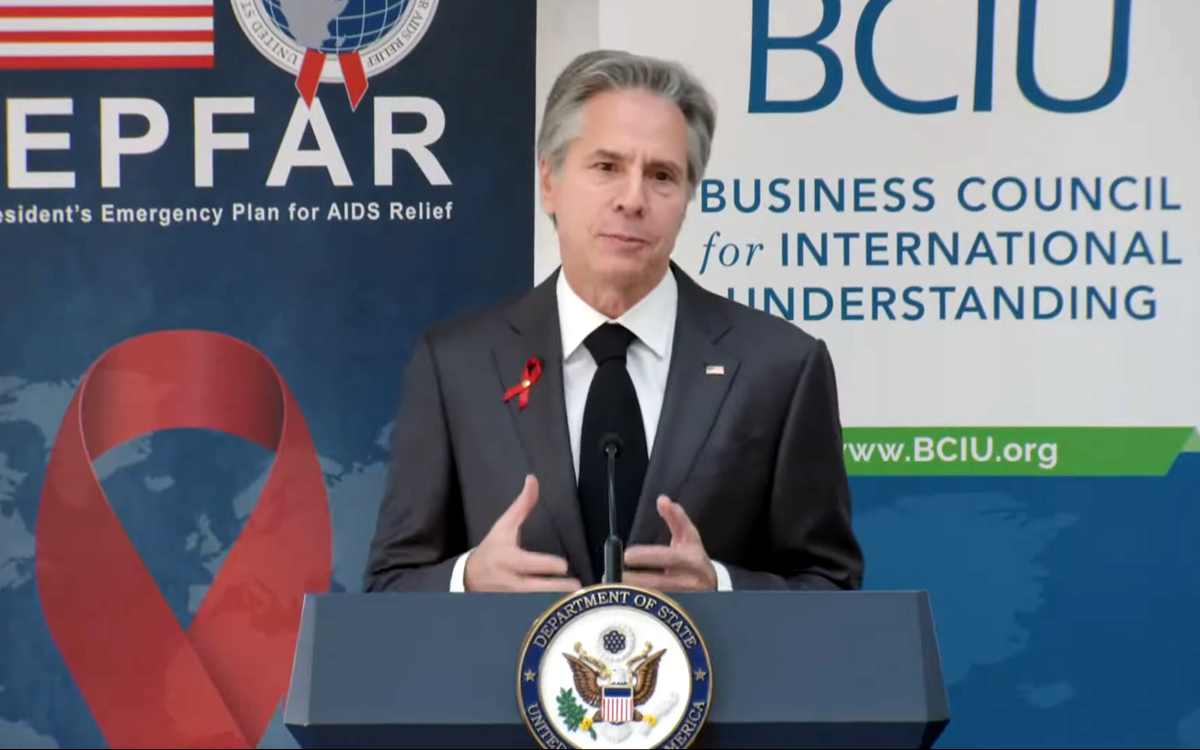
Stern is currently teaching at Columbia University’s School of International and Public Affairs, and is writing about her experience as the “first-ever human rights expert to be the special U.S. envoy for LGBTQI rights.” Stern also told the Blade that she is working to launch a new organization.
“I love being an activist again,” she said. “If there was ever a time when activists are needed, it’s now.”
“I am really proud to have rejoined the resistance,” added Stern.
National
Destination Tomorrow works to empower LGBTQ community
Sean Coleman is Black transgender man who founded group in 2009
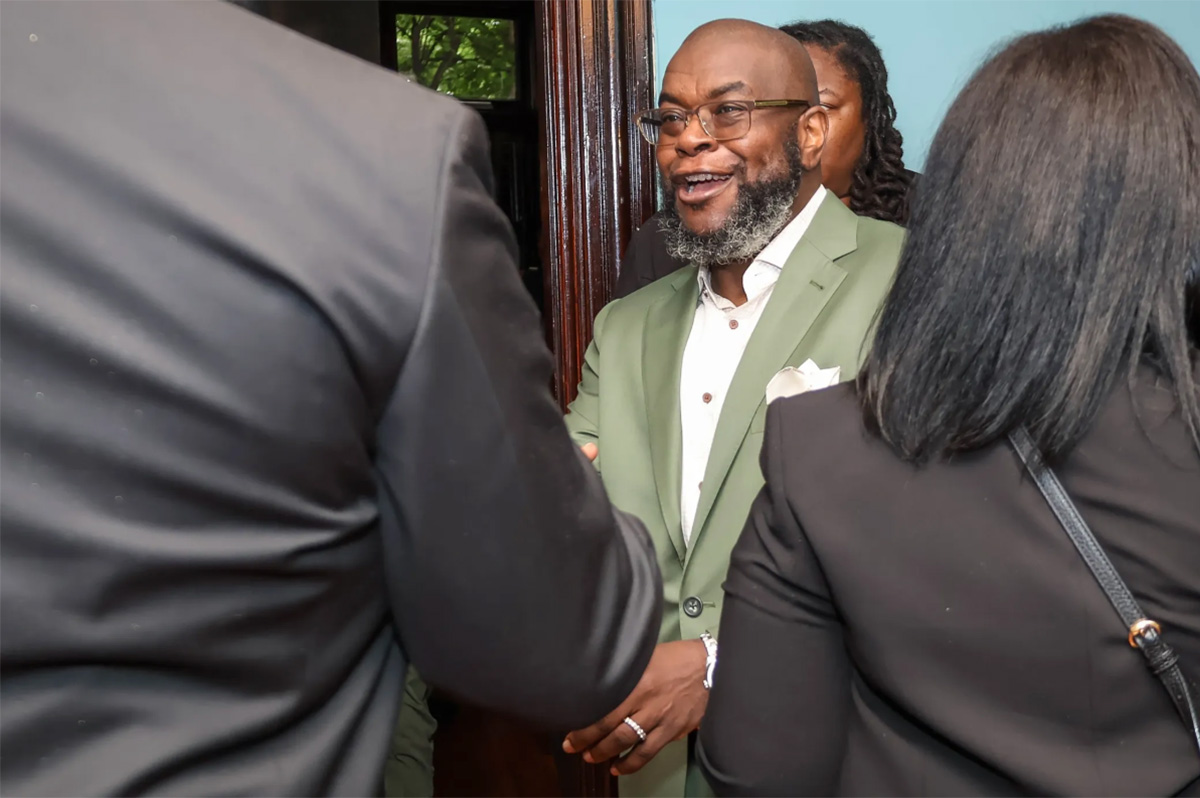
Sean Ebony Coleman became the first transgender African American to own and operate an LGBTQ center with the founding of Destination Tomorrow in 2009. Subsequent centers opened up in Atlanta in 2022 and D.C. in 2024.
Destination Tomorrow was founded on the idea that “it is more helpful to empower our most vulnerable TLGBQ+ community members in a way that takes them off the path of needing emergency care.”
“Our organization emphasizes economic, social, and mental empowerment through a variety of holistic educational, financial, support-based, housing, and health programs,” Destination Tomorrow said on the organization’s website.
With Transgender Day of Visibility today and WorldPride coming to D.C. this June, the Washington Blade spoke with Coleman to get some further insight into how Destination Tomorrow and other organizations are responding to the pressure the Trump-Vance administration is putting on the LGBTQ community.
BLADE: What was the overall reaction to the Trump administration and the heavy anti-LGBTQ rhetoric being pushed by the administration from Destination Tomorrow?
COLEMAN: I think the first thing was disbelief, right? You know he’s not well versed, but the embellishments about the community, particularly the trans community, were so outlandish that they became dangerous. So I think the first thing was, people actually believe this, and we have a message in problem because we’re not responding. We really missed an opportunity to message that differently. Like some of them it was so easy for us to respond and say, “We’re talking about the entire sports world when it comes to college and high school” and those kinds of things, right? We are definitely focusing on the wrong one percent.
I knew it was like collectively as a trans man, just personally, I was like “okay, so how do you show up now?” You’re in a position that folks expect you to at the very least have something positive to say next steps, this is what we’re gonna do, marching all this, whatever. I’m sitting with it like, no, I’m a little nervous. In the moment, most of the danger and most of the rhetoric is happening towards trans and gender nonconforming people and unfortunately, Black and brown and trans and gender nonconforming folks feel it worse when things like this happen.
BLADE: With a lot of organizations getting threats, losing funding, and everybody just being scared, has Destination Tomorrow specifically received any higher amounts of traffic to your locations, either here or other states?
COLEMAN: All three locations have seen an uptick. Funny thing a lot of them are coming in because they just want community. and we do that intake assessment. Then we say “while we have you here, we could do all of these other things.” But it’s really about them coming for community. If you know anything about us, we’re well versed in the house and ballroom community. So we put on balls. We’re planning one now.
And the young people, particularly young trans people, are also coming in for the ball, but they also want to know. Mr. Coleman, what can we do now? What is it? They want a call to action, want to be motivated and I think we have to figure out again this one message of where we’re going to go. Whether it is New York, Atlanta, and D.C., Destination Tomorrow is then going through all of the other trans into the nonconforming organizations. Speaking in one voice and figuring out what movement building looks like for us in this moment and we think that young people should drive it.
Particularly in New York and D.C. will receive some additional resources because we want to be able to address those folks that are going to come in. We want to make sure (to have enough) staff, (increase) our hours. We increase our security and our security presence because that was something that we were concerned about, even if it’s just an in person meeting that we’ve been doing for the last five years, because how do we keep those meetings and that meeting space and our identity safe?
BLADE: Do you feel like given the recent federal government layoffs and this whole Trump takeover of Washington, like, do you think D.C. is prepared or safe enough to start implementing those things that you want to try and get done?
COLEMAN: Yes. I think once we’ve taken a moment to step back and assess the situation, we will be able to come out stronger with the initiative that is going to be most important and most impactful for our community, but I think it is going to take some collaborative effort. I don’t think one agency is gonna be able to do it. I think this is a time for collaboration and allies. um, and not in that order. Right? But D.C. is definitely a safe place for LGBT community members worldwide.
It’s gonna be an amazing time. We’re gonna get an opportunity to show how resilient our community is, how much love we still receive. If you look at some things on social media, it’ll seem like everyone’s demonizing the trans and general nonconforming community and that’s not necessarily the case, right? I think we get sucked into this vacuum with social media and I think once you log off and you actually go outside, you recognize exactly how much support you have from your community. And I think that ties back into our messages. We’re not going to stand around sad and defeated. We’re going to show up, have a good time with WorldPride.
I also see it as an excellent opportunity to strategically put some plans in place. While we have you here, and we’re celebrating, we’re partying, but here is what our next steps will be. We have at least two or three next steps that collectively, you can go back down and all of us a picture goes saying two or three things. Say the same things, stay on message and I think World Pride will be an excellent opportunity to do so.
Along with the comments on TDOV and WorldPride, Coleman also spoke about the current state of LGBTQ politics.
“What’s so unfortunate for me is that we lean into our allies, right? Now is the time for our allies to take a look around the room and say “Oh wait. This person is missing [in the conversation], we should not be speaking on behalf of Black and brown people,” he told the Blade. “I specifically say Black and brown trans people. [Allies] shouldn’t be speaking on behalf of them because I know a few that can actually come here and speak on their own behalf and unfortunately it doesn’t happen. I think it’s because it’s tied into the losing funding across the board. So those LGB organizations are gonna feel that loss. And at some point they may feel like they have to step in and fill a void that they don’t necessarily have to because we’re here.”
Specifically in New York, Coleman has been looking toward the local government to help Destination Tomorrow and other organizations stay protected and operational during times like these.
“Trans, gender nonconforming and LGB issues go across different issues. Whether we’re talking about housing, criminal justice reform, or reproductive rights. We should be included in those discussions, and we should be included in those funding opportunities,” said Coleman. “And I think this gives us an opportunity to show that Destination Tomorrow has a program called Pride at Work. to the workforce development program, where we’re pitching it in D.C. and we’re actually in our third year of doing it in New York City. That’s an example of how workforce development should be for all of us, right?”
“So a lot of the work we’ve done in the last couple of months is really meeting with all our elected officials and saying, ‘This is the message that we’d like you to push. This is what we want to say, this is how we feel. Because you are not saying it, it feels like you left us behind. This is where you are missing the mark and it is up to you to fix it,’” he added.
A discussion for New York mayoral candidates took place later that evening. One of the things that Coleman wanted to heavily iterate to the candidates was that “at the end of the day, we’re paying attention now. We may not have been as politically engaged as we should have been, but we are now.”
-

 Virginia5 days ago
Virginia5 days agoFairfax County School Board issues Trans Day of Visibility proclamation
-

 Trinidad and Tobago5 days ago
Trinidad and Tobago5 days agoTrinidad and Tobago recriminalizes homosexuality
-

 National2 days ago
National2 days agoDestination Tomorrow works to empower LGBTQ community
-

 Maryland2 days ago
Maryland2 days agoAt transgender visibility celebration, Moore called out for lack of action



